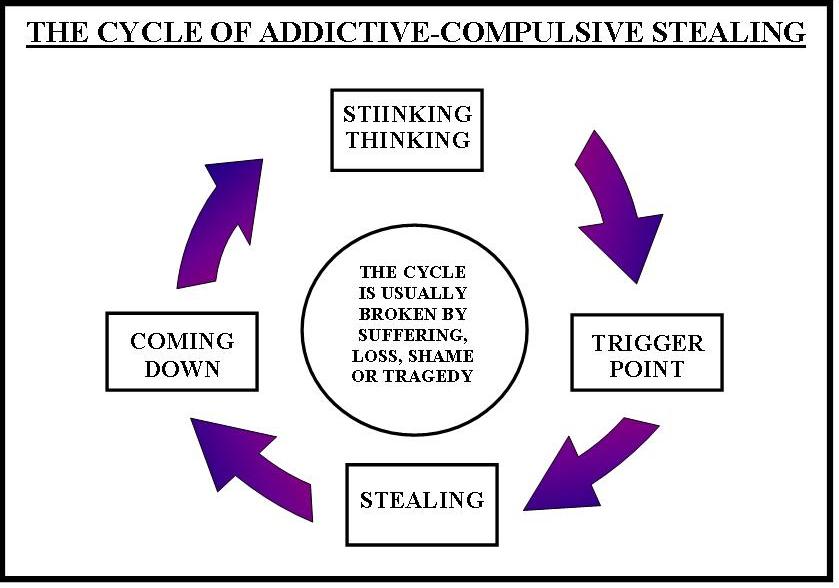The Cycle of Addiction
| Before you begin this page, please review my DISCLAIMER. This website is not intended to render clinical, legal, or other professional services, and should not be considered – in any way – a substitute for legal advice, professional therapy/counseling, or group therapy. |
The following is a brief snapshot of what addiction really looks like. Remember that the words “addiction” and “compulsion” mean basically the same thing when used in this material.
Below is a chart I developed of the addictive-compulsive stealing cycle in its basic form. The concepts behind this chart are not original, and they are common to most materials dealing with shoplifting addiction. (My primary resource was “Breaking Addiction: A 7-Step Handbook for Ending Any Addiction” by Lance M. Dodes, MD.)
Let’s look at each stage of the cycle:
- Stinking Thinking:
The cycle of addictive-compulsive stealing begins with what many call “Stinking Thinking.” Simply put, stinking thinking is a “thinking error” that leads to a feeling of helplessness. Stinking thinking is therefore false thinking, and the person engaged in these thinking errors feels unable to directly solve the underlying emotional issue. (See below for examples of underlying emotional issues.) There is a point reached within the stinking thinking process called the “Trigger Point” or “The Key Point of Addiction.”
Try to list some areas of your life that tend to bring you down emotionally. Do you feel helpless to resolve some of them? Do you think these situations are related to your addiction to theft?
____________________________________________________________________
____________________________________________________________________
____________________________________________________________________
____________________________________________________________________
____________________________________________________________________
____________________________________________________________________
____________________________________________________________________
____________________________________________________________________
____________________________________________________________________
____________________________________________________________________
____________________________________________________________________
____________________________________________________________________
- Trigger Point:
The Trigger Point of addiction is at the very moment a person decides to steal. This is the time when the addict is closest to his addiction. You face an emotional situation that leaves you feeling vulnerable and helpless because you are unequipped to deal with the overwhelming feeling of helplessness. It is at this very moment that you make the decision to steal.
Recount as accurately as possible some instances when you shoplifted. What were you feeling at the moment you decided to shoplift? (Remember, these are your thoughts just prior to making the decision to steal.)
____________________________________________________________________
____________________________________________________________________
____________________________________________________________________
____________________________________________________________________
____________________________________________________________________
____________________________________________________________________
- Stealing:
Addiction is not actually caused by a desire to get something for nothing through stealing. The overwhelming majority of people who steal do not need the items they take. The real addiction cause is the underlying emotion you have not learned to deal with. The stealing is therefore misplaced rage, stealing in response to the inability to resolve the deeper emotional feeling of helplessness.
- Coming Down:
Following the theft, there is usually a feeling of satisfaction, relief, and or triumph – especially if the addiction is in its early stage. However, after the “high” or “thrill” of victory, the typical shoplifter experiences remorse and shame for the act of theft. The shame and experience of violating his own conscience bring him back to “Stinking Thinking” and starts the cycle all over again.
Describe in detail the feelings that you had immediately after you “got away with” shoplifting. Next, describe your emotional downward spiral. Were you conflicted about violating your own moral code? Can you recall how your mind returned over time to a desire to steal again?
____________________________________________________________________
____________________________________________________________________
____________________________________________________________________
____________________________________________________________________
____________________________________________________________________
____________________________________________________________________
____________________________________________________________________
____________________________________________________________________
____________________________________________________________________
____________________________________________________________________
____________________________________________________________________
____________________________________________________________________
Underlying Emotional Issues
As you will learn, most people do not steal because of physical need or greed. For example:
- You may feel that you care for the people in your life, yet there is no one to care for your needs. You are helpless to make people see and address your needs. Stealing provides a way for you to take care of your own needs for a change.
- You may feel that you are not assertive enough. Someone at work, your significant other, or everyone is always telling you what to do – and you can’t speak up for yourself. You, therefore, feel powerless. Stealing gives you a feeling that you have power and that you are in control of something.
- You may feel that life is too hard to deal with. There are too many problems and too much pain. When you steal you escape to an exciting and focused time when you can only think about getting away with the crime.
- Life is not fair, and the rich have an unfair advantage. You feel like a helpless victim filled with rage. When you steal you feel like Robin Hood, stealing from the rich to give to the poor (you).
- You may feel that you are not very good at anything in life. You feel helpless to get ahead in this dog-eat-dog world. Through shoplifting, you have found a way to be really good at something.
Look in Terry Shulman’s book, “Something for Nothing,” on page 71 for “The Top Ten Reasons People Shoplift.” (This workbook assumes that you bought Terry’s book and read it.) Make a list of the reasons that apply to you, and then prioritize your reasons 1-10 in the order that is most meaningful to you. Take this list with you when you go to your next therapy session.
____________________________________________________________________
____________________________________________________________________
____________________________________________________________________
____________________________________________________________________
____________________________________________________________________
____________________________________________________________________
____________________________________________________________________
____________________________________________________________________
____________________________________________________________________
____________________________________________________________________
____________________________________________________________________
____________________________________________________________________
The cycle can be broken, and it will happen at the “Key Point of Addiction.” That is the very moment you decide to shoplift.
(The primary idea of “Key Point of Addiction” was adapted from “Breaking Addiction: A 7-Step Handbook for Ending Any Addiction” by Lance M. Dodes, MD. See the Resources Page for more details. I highly recommend that you get this book/audiobook, as it was a strong influence in helping me to stop shoplifting.)

